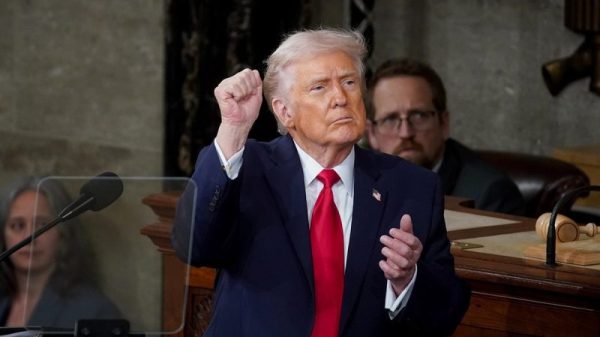Congressional leaders reached a $1.66 trillion agreement Sunday to finance the federal government in 2024, preserving funding for key domestic and social safety net programs despite GOP demands to cut the budget.
Now lawmakers are up against a stiff deadline to pass legislation to codify the deal and avert a partial government shutdown in less than two weeks. Funding runs out for roughly 20 percent of the government — including for essential programs such as some veterans assistance, and food and drug safety services — on Jan. 19, and money for the rest of the government runs out shortly after that, on Feb. 2.
The agreement, announced jointly by Senate Majority Leader Charles E. Schumer (D-N.Y.) and House Speaker Mike Johnson (R-La.), will almost surely face vehement opposition from far-right House Republicans, who had hoped to force steep budget cuts.
“I fear that there will ultimately be a deal that’s bad for the country. It’s bad for the American people, that’s bad for the deficit and bad for the national debt,” Rep. Bob Good (R-Va.), chair of the archconservative House Freedom Caucus, told The Washington Post last week. “I hope it’s not the case. I’m certainly trying to persuade Speaker Johnson otherwise — trying to persuade my Republican colleagues to stand with the speaker in having his back to fight to cut spending year-over-year, to implement the policies that reverse the harm that’s been done by the Biden-Pelosi-Schumer policies that are in place right now.”
The Freedom Caucus in a statement Sunday called the agreement a “total failure” and “totally unacceptable.”
The deal allows for $886.3 billion in defense spending, the leaders announced, and $772.7 billion in domestic discretionary spending. It rescinds $6.1 billion in coronavirus emergency spending authority and accelerates cuts from $80 billion in new funding that the Internal Revenue Service was supposed to get under the 2022 Inflation Reduction Act, stripping $20 billion of that total this year.
“The bipartisan funding framework congressional leaders have reached moves us one step closer to preventing a needless government shutdown and protecting important national priorities,” President Biden said in a statement. “It reflects the funding levels that I negotiated with both parties and signed into law last spring. It rejects deep cuts to programs hard-working families count on, and provides a path to passing full-year funding bills that deliver for the American people and are free of any extreme policies.
Johnson, in a letter to GOP lawmakers, called the Sunday agreement “the most favorable budget agreement Republicans have achieved in over a decade.”
Already, disagreements have emerged over the IRS funding provisions in the new agreement. The agency was supposed to get billions over 10 years to modernize and strengthen tax enforcement against high earners and major corporations. Schumer and Democrats say they agreed only to speed up cuts to the IRS, docking $20 billion in total from the agency. Johnson and Republicans say they negotiated an addition $10 billion clawback, for a $30 billion cut.
The agreement mostly adheres to a deal reached by Biden and then-Speaker Kevin McCarthy (R-Calif.) last spring to suspend the nation’s debt limit in exchange for limiting discretionary spending to $1.59 trillion in 2024, with 1 percent growth in 2025. Because that represented a cut when taking inflation into account, Biden and McCarthy agreed to spend another $69 billion each year in a side deal, with some of that offset by repurposing existing funds.
But far-right House Republicans were unhappy with that arrangement, and ousted McCarthy in October for adhering to the agreement preserving its spending levels with help from Democratic votes. (McCarthy resigned from Congress at the end of 2023.)
A bruising three-week process in the fall to replace McCarthy chewed through three of the Republican conference’s top leaders before the party settled on Johnson. He, like McCarthy, has struggled to maintain control over the raucous Republican House.
From the far right, the Freedom Caucus has urged Congress to reset spending levels to pre-pandemic amounts and attach conservative policy amendments — including limits on abortion access and harsh immigration restrictions — to spending legislation.
Other Republicans, namely 18 GOP lawmakers from districts that Biden carried in the 2020 election, have called on Johnson to take a more pragmatic approach to budget cuts and stave off far-right attempts to include social policy in funding legislation.
“We have made clear to Speaker Mike Johnson that Democrats will not support including poison pill policy changes in any of the twelve appropriations bills put before the Congress,” Schumer and House Minority Leader Hakeem Jeffries (D-N.Y.) said in a joint statement.
So far, Johnson has tried to appease both camps — with mixed results. For right-wingers, the speaker has drawn a hard line on emergency assistance for Israel and Ukraine, spurning Biden’s $106 billion spending request that covered aid for both war-stricken nations, humanitarian assistance and border security resources. Johnson paired $14 billion for Israel with the same amount of cuts to the IRS, a move that nonpartisan analysts say would actually cost taxpayers more money by hampering the agency’s ability to collect revenue. That measure passed the House and failed in the Democratic-controlled Senate.
But Johnson has not secured the spending cuts for which the Freedom Caucus has argued.
Instead, Johnson staggered government funding deadlines at the current spending levels, and the new agreement would continue those levels — a rate of spending that led conservatives to oust McCarty.
Border security and immigration could pose a political hurdle for the new spending deal. Dozens of House Republicans last week argued that Johnson should attach demands for new immigration restrictions to any government funding deal, not just to the legislation for aid to Ukraine and Israel where Biden is already seeking border funds.
During a trip to the U.S.-Mexico border at Eagle Pass, Tex., on Wednesday, some GOP lawmakers said they would not vote for federal financing unless Democrats agreed to pass H.R. 2, legislation to reinstate Trump-era immigration policies.
The measure, which has already passed the House, would significantly limit migrants’ ability to claim asylum, restart construction of a border wall and cut into Biden’s power to grant humanitarian parole to migrants.
“We shouldn’t fund nonessential parts of the government until the border is secure,” Good said.
Congressional leaders reached a $1.66 trillion agreement Sunday to finance the federal government in 2024, preserving funding for key domestic and social safety net programs despite GOP demands to cut the budget.
Now lawmakers are up against a stiff deadline to pass legislation to codify the deal and avert a partial government shutdown in less than two weeks. Funding runs out for roughly 20 percent of the government — including for essential programs such as some veterans assistance, and food and drug safety services — on Jan. 19, and money for the rest of the government runs out shortly after that, on Feb. 2.
The agreement, announced jointly by Senate Majority Leader Charles E. Schumer (D-N.Y.) and House Speaker Mike Johnson (R-La.), will almost surely face vehement opposition from far-right House Republicans, who had hoped to force steep budget cuts.
“I fear that there will ultimately be a deal that’s bad for the country. It’s bad for the American people, that’s bad for the deficit and bad for the national debt,” Rep. Bob Good (R-Va.), chair of the archconservative House Freedom Caucus, told The Washington Post last week. “I hope it’s not the case. I’m certainly trying to persuade Speaker Johnson otherwise — trying to persuade my Republican colleagues to stand with the speaker in having his back to fight to cut spending year-over-year, to implement the policies that reverse the harm that’s been done by the Biden-Pelosi-Schumer policies that are in place right now.”
The Freedom Caucus in a statement Sunday called the agreement a “total failure” and “totally unacceptable.”
The deal allows for $886.3 billion in defense spending, the leaders announced, and $772.7 billion in domestic discretionary spending. It rescinds $6.1 billion in coronavirus emergency spending authority and accelerates cuts from $80 billion in new funding that the Internal Revenue Service was supposed to get under the 2022 Inflation Reduction Act, stripping $20 billion of that total this year.
“The bipartisan funding framework congressional leaders have reached moves us one step closer to preventing a needless government shutdown and protecting important national priorities,” President Biden said in a statement. “It reflects the funding levels that I negotiated with both parties and signed into law last spring. It rejects deep cuts to programs hard-working families count on, and provides a path to passing full-year funding bills that deliver for the American people and are free of any extreme policies.
Johnson, in a letter to GOP lawmakers, called the Sunday agreement “the most favorable budget agreement Republicans have achieved in over a decade.”
Already, disagreements have emerged over the IRS funding provisions in the new agreement. The agency was supposed to get billions over 10 years to modernize and strengthen tax enforcement against high earners and major corporations. Schumer and Democrats say they agreed only to speed up cuts to the IRS, docking $20 billion in total from the agency. Johnson and Republicans say they negotiated an addition $10 billion clawback, for a $30 billion cut.
The agreement mostly adheres to a deal reached by Biden and then-Speaker Kevin McCarthy (R-Calif.) last spring to suspend the nation’s debt limit in exchange for limiting discretionary spending to $1.59 trillion in 2024, with 1 percent growth in 2025. Because that represented a cut when taking inflation into account, Biden and McCarthy agreed to spend another $69 billion each year in a side deal, with some of that offset by repurposing existing funds.
But far-right House Republicans were unhappy with that arrangement, and ousted McCarthy in October for adhering to the agreement preserving its spending levels with help from Democratic votes. (McCarthy resigned from Congress at the end of 2023.)
A bruising three-week process in the fall to replace McCarthy chewed through three of the Republican conference’s top leaders before the party settled on Johnson. He, like McCarthy, has struggled to maintain control over the raucous Republican House.
From the far right, the Freedom Caucus has urged Congress to reset spending levels to pre-pandemic amounts and attach conservative policy amendments — including limits on abortion access and harsh immigration restrictions — to spending legislation.
Other Republicans, namely 18 GOP lawmakers from districts that Biden carried in the 2020 election, have called on Johnson to take a more pragmatic approach to budget cuts and stave off far-right attempts to include social policy in funding legislation.
“We have made clear to Speaker Mike Johnson that Democrats will not support including poison pill policy changes in any of the twelve appropriations bills put before the Congress,” Schumer and House Minority Leader Hakeem Jeffries (D-N.Y.) said in a joint statement.
So far, Johnson has tried to appease both camps — with mixed results. For right-wingers, the speaker has drawn a hard line on emergency assistance for Israel and Ukraine, spurning Biden’s $106 billion spending request that covered aid for both war-stricken nations, humanitarian assistance and border security resources. Johnson paired $14 billion for Israel with the same amount of cuts to the IRS, a move that nonpartisan analysts say would actually cost taxpayers more money by hampering the agency’s ability to collect revenue. That measure passed the House and failed in the Democratic-controlled Senate.
But Johnson has not secured the spending cuts for which the Freedom Caucus has argued.
Instead, Johnson staggered government funding deadlines at the current spending levels, and the new agreement would continue those levels — a rate of spending that led conservatives to oust McCarty.
Border security and immigration could pose a political hurdle for the new spending deal. Dozens of House Republicans last week argued that Johnson should attach demands for new immigration restrictions to any government funding deal, not just to the legislation for aid to Ukraine and Israel where Biden is already seeking border funds.
During a trip to the U.S.-Mexico border at Eagle Pass, Tex., on Wednesday, some GOP lawmakers said they would not vote for federal financing unless Democrats agreed to pass H.R. 2, legislation to reinstate Trump-era immigration policies.
The measure, which has already passed the House, would significantly limit migrants’ ability to claim asylum, restart construction of a border wall and cut into Biden’s power to grant humanitarian parole to migrants.
“We shouldn’t fund nonessential parts of the government until the border is secure,” Good said.





















